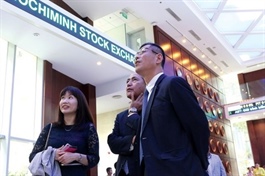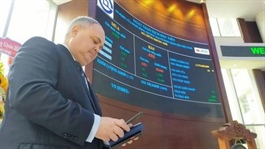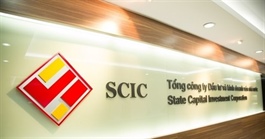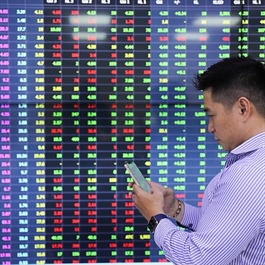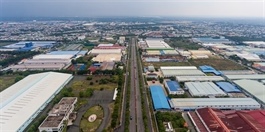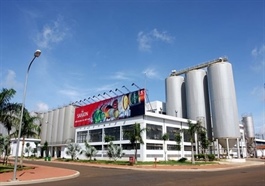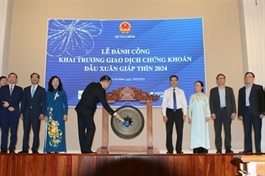Stock market appeal efforts now underway
Stock market appeal efforts now underway
Vietnam’s push to upgrade its stock market this year hinges on overcoming significant regulatory and technological hurdles to align with global standards.

In an ambitious bid to elevate Vietnam’s stock market from a frontier to an emerging market by 2025, the Vietnamese prime minister in mid-February issued a directive mandating the Ministry of Finance (MoF) to lead, in coordination with the State Bank of Vietnam and the Ministry of Planning and Investment, urgent resolution of all challenges impeding the market’s reclassification.
The government’s resolve to boost the stock market’s profile is clear, with a progress report demanded by July.
Financial experts anticipate that the upgrade could unlock a torrent of billions of US dollars in foreign investments. According to VinaCapital, the implementation of the new Korean Exchange (KRX) trading system within Q1 2024 is pivotal to addressing technical barriers, potentially paving the way for a reclassification by FTSE-Russell by year-end. “The new trading system is a game-changer for Vietnam, setting the stage for our ascent to the emerging market status,” VinaCapital said.
Efforts are also underway to enhance the market’s attractiveness, including the early deployment of the KRX trading system and the removal of the 100 per cent pre-funding requirement for institutional investors’ securities purchases.
VinaCapital also predicts that, upon the market’s upgrade, Vietnamese stocks could comprise about 0.7-1.2 per cent of the MSCI and FTSE Russell emerging markets indices, potentially channelling an additional $5-8 billion from foreign investors into the Vietnamese stock market.
SSI Securities projects an optimistic scenario where FTSE Russell could elevate the Vietnamese market to emerging status as early as September this year, with a baseline scenario pointing to March 2025.
“Vietnam could immediately attract $1.7-2.5 billion in foreign investments following the upgrade,” SSI said.
A recent analysis by BIDV Securities (BSC) places Vietnam in the Frontier Market category, as per the classifications of all three leading rating agencies.
Vietnam currently aligns with seven out of nine FTSE criteria for Secondary Emerging Market status. However, it fulfils only half of MSCI’s requirements, meeting nine out of 18 criteria.
BSC also forecasts a significant influx of foreign investment through open funds and exchange-traded funds (ETFs) tracking MSCI and FTSE indices. The firm’s research suggests that an upgrade could lead to $3.5-4 billion in fresh investments in Vietnamese stocks, assuming an average weighting of 0.7 per cent, akin to the Philippine stocks in FTSE’s emerging market index.
“The anticipation of MSCI and FTSE upgrades could see a substantial flow of capital into Vietnam, mirroring the success of similarly positioned markets,” noted a BSC analyst. “As Vietnam is not currently on MSCI’s upgrade watch list but is on FTSE’s, the market eagerly anticipates official reclassification. Upon FTSE Russell’s official upgrade, we expect to welcome approximately $1.3-1.5 billion from ETFs and open funds, a significant boost comparable to the Philippine market.”
Investors are advised to monitor several key developments closely, including annual market classification reviews, particularly FTSE’s assessments, progress with the KRX system’s deployment, regulatory efforts to address pre-funding issues, foreign ETF activities, and the engagement of relevant ministries and agencies in the upgrade process.
Wanming Du, FTSE Russell’s director of Index Policy for Asia-Pacific, said, “The foreign ownership limit and simplification of account opening procedures for international investors were identified as pivotal, albeit not directly influencing ranking metrics. Similar foreign ownership restrictions are encountered across significant Asian markets, including China, Thailand, Japan, and South Korea. Vietnam is not alone in this regard.”
FTSE Russell has pinpointed “delivery versus payment” and the issue of “settlement costs associated with failed trades” as areas needing attention. The prevalent practice in Vietnam of ensuring fund availability before transactions has effectively mitigated failed trades, rendering the latter criterion somewhat moot in the local context.
On the MSCI front, Vietnam’s market remains outside the consideration set for an upgrade, with no marked progress on the nine outstanding criteria since before 2021.
MSCI’s analysis also identifies critical areas for improvement, notably the foreign investor registration process, currently necessitating Vietnam Securities Depository approval, and the accessibility of legal and corporate disclosures in English, ensuring equitable information access for international investors.
Accordingly, BSC experts highlight a series of regulatory adjustments needed to propel Vietnam towards its upgrade ambition. These include the establishment of a central counterparty clearing house - a linchpin for both FTSE and MSCI - enhancements in market infrastructure, transparency, corporate disclosure quality, and policy and legal framework refinement.
Addressing foreign ownership caps and streamlining the foreign investor account registration process are also flagged as essential steps, alongside bolstering investor protection measures and regulatory oversight.
“Our strategy encompasses addressing critical areas such as FTSE-highlighted criteria, resolving foreign ownership limit issues, and increasing market transparency,” said Ta Thanh Binh, director of the Securities Market Development Department under the State Securities Commission. “We are in the process of proposing amendments to key legal frameworks that provide guidance on the LSecurities Law, along with relevant financial circulars. Our goal is to introduce a consolidated amendment circular to simplify the update process. Currently, the draft is in its final stages of preparation, awaiting review by the MoF, after which we will seek feedback from the market,” Binh added.



